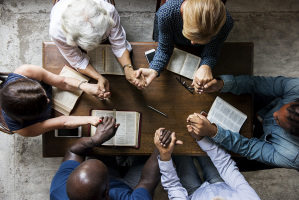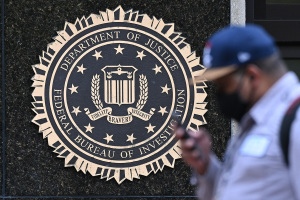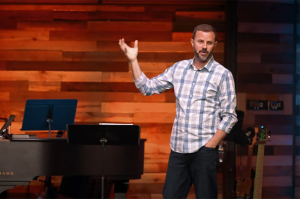How Churches are Harming Human Trafficking Victims
Did you know that January is National Slavery and Human Trafficking Prevention month? According to the White House, this is a time to reflect on modern-day slavery and "renew our commitment to ending this scourge in all its forms." A project of the United Methodist Church, on the other hand, is committing to emphasize "reproductive services" for victims without regard for their emotional, physical and spiritual health.
Forced slavery is a $32 billion industry. It exists everywhere and knows no borders. An estimated 21 million people are trafficking victims. According to the International Labor Organization, 11.4 of those victims are women and girls. And 4.5 million of the total enslaved are victims of sexual exploitation,
In an attempt to assist these female victims, the United Methodist Church's General Board of Church and Society (GBCS) and Healthy Families, Healthy Planet project hosted a webinar "Hope Through Healing: Addressing the Reproductive Health Needs of Human Trafficking Survivors" on January 15th, 2014. Speakers included Susan Burton, the Director of Women's and Children's Advocacy, and Katei Zeh, director of the GBCS's project.
Noting trafficking victims' high number of sexual partners and high risks for unintended pregnancy, the GBCS project asserted that churches must respond in three ways: (1.) Ensure young people have accurate info about their reproductive health needs. (2.) Make faith communities a safe place to talk about sexuality that affirms them as children of God, and (3.) Raise children to recognize the honor and dignity of girls and women.
Obviously skimming over the serious women's issues at hand, I attempted to clarify what the experts defined as "reproductive services" during the Q&A session.
My questions, verbatim, submitted to the moderators:
Do you include oral contraception, abortifacients, or abortion within "reproductive health services"? If so, are you concerned about the harmful physical, emotional and spiritual effects these are all known to have on women and girls? (For example, the known birth control/breast cancer link.)
Full disclosure: my submit button was pressed several times in an attempt to nab the moderators' attention. My concerns were never addressed. But their non-answers were revealing.
In my last Christian Post piece, "An Evangelical Woman's Response to the 'Unease Over Contraception'" I emphasized the need for Christian women, men, and clergy to seriously consider the Pill's harmful spiritual, socio-economic and physical effects before promoting its use. But as the conversation shifts towards human trafficking, it is even more imperative that the Church recognize the detrimental impacts of so-called "reproductive services" or "family planning," before hoisting abortions, abortifacients, and chemical contraception onto already vulnerable and hurting women and girls.
We already know that abortifacients and emergency contraception like "Plan B," more commonly known as the "morning-after pill," are a pimps dream. In Thailand, the morning-after pill has been freely available since 1988. Men are the largest purchasers. No surprise since Thailand is considered a sex-trafficking hot spot.
Another concern over emergency contraception is that we do not know the long-term effects these chemicals will have on girls. But what we do know about these potent drugs are frightening. Plan B is the commercial name for Levonorgestrel, a chemical drug with potentially dangerous effects including, infections, blood clotting, and liver damage.
Abortion is known to cause a myriad of health and emotional problems for women, including maternal death as well as the destruction of innocent life. Post-abortive women report symptoms of depression, anxiety, thoughts of suicide brought on by guilt, breast cancer, future ectopic pregnancies, sexual dysfunction and the list literally, and sadly, goes on and on.
Instead of promoting dangerous "reproductive services" that only placate sex trafficking, the Church can take a moral and effective role in aiding victims by ensuring the demand ceases to exist.
Brenda Zurita, Research Fellow of the Beverly LaHaye Institute and author of an anti-trafficking amendment to the William Wilberforce Trafficking Victims Protection Reauthorization Act, explains the churches can start by rejecting prostitution. "Prostitution and sexual trafficking are inextricably linked and abolition is the only answer to end the horrors of both," Zurita says. She continued, "Legalization and harm reduction will not change the perception of prostitution. Abolition brings back the balance of power and gives the prostituted person dignity and worth. Men and women on equal ground and children being celebrated for their innocence – not violated because of it – is the goal of the abolitionist movement."
The religious community plays a vital role in shedding light on the human trafficking problem. Susie Johnson of United Methodist Women noted, "It may be that a young runaway goes to someone in the church. It maybe that someone in a church has been educated and they then get in contact with authorities about this issue."
Therefore, Methodists, Baptists, Anglicans, Catholics, or anyone who professes to follow Christ must continue to speak publically and intelligently against human trafficking and promote health and safety measures that do not further endanger victims' lives. But again, to do this, Christians need to leave their ideological and political agendas at the door and examine the depths of what Scripture, medial science, and social science have to say about abortion, abortifacients and the Pill.




























